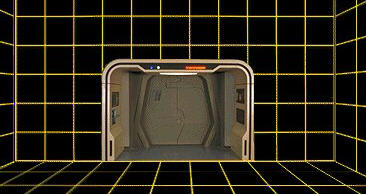Ahhh the future! The possibilities are limitless! If you have been following my blogs then you may have noticed that their all about technology, a key theme is how fast it has grown. The question that can be asked is, 'Who knows?' because the future is indefinite - that's the beauty of it, anyone can get speculating! So, with that in mind this blog is me rambling on about what my idea of the future is for Digital Culture.
One major idea that will become an everyday use is holograms. This bit of tech will allow us to access various places without leaving our homes. It will also enable the military to train its troops in realistic environments without being killed or hurt. Technology like this has already been used to demonstrate its capabilities:
On CNN a holographic image of a correspondent was projected into the studio
 |
| The Holodeck: The user can re-create anything |
This obviously is in the very very early stages and is not really true to the holographic name. This is because the only way she can be seen is by watching it through a TV, the man can't actually see her too, only through a TV. A hologram should be seen without any aid, now I can only refer to films here, in Star Wars the famous 'You are my only hope' scene is how a hologram should work. If it is perfected in the future the Holodeck should become a reality, every home may have one. The Holodeck is a room from Star Trek (I know, another film, but these original ideas are what fuels technology today) where the user can create a bespoke 'program' and enter, interact and become part of it. This however increases the chance of society become lost in what is not real, I will talk about this later.
Televisions will improve just as they have already, from the boxed CRT screens to the HD and now 3D ready flat plasma or LCD screens the future of this technology will only get better. One currently in development is OLED screens, these TV's are to replace LCD and Plasma screens as an industry standard. At the moment they are only of small size and cost high amounts but as the tech evolves the price will drop massively as seen recently with HD TV's. This OLED technology can turn flexible and transparent reaching for that familiar sight in many Sci-Fi films. Who knows, could this lead to the Harry Potter style newspapers where the images actually move??
So TV's will constantly improve, here is a video to show what the far future holds (of course, only conceptual sadly):
So what the future holds, we don't know but from inspiration from films and other bits of tech we can create conceptual ideas. Ubiquity will be the key in my opinion, as we live our lives everything will be streamed to us instantly in real-time. But if things like the Holodeck becoming a reality it could make us lazy, make us more reliant on technology than we already are. If the Internet turns into a Virtual Reality where the user can actually walk into the Net then we could loose what is real and eventually become to like what is real and stay in what is not. If we can create anything in the Holodeck then why would we want to leave? The internet idea, similar to the concept in a Futurama episode allows the social aspect to become magnified, but if this all happens will we be able to trust everything that we see?



